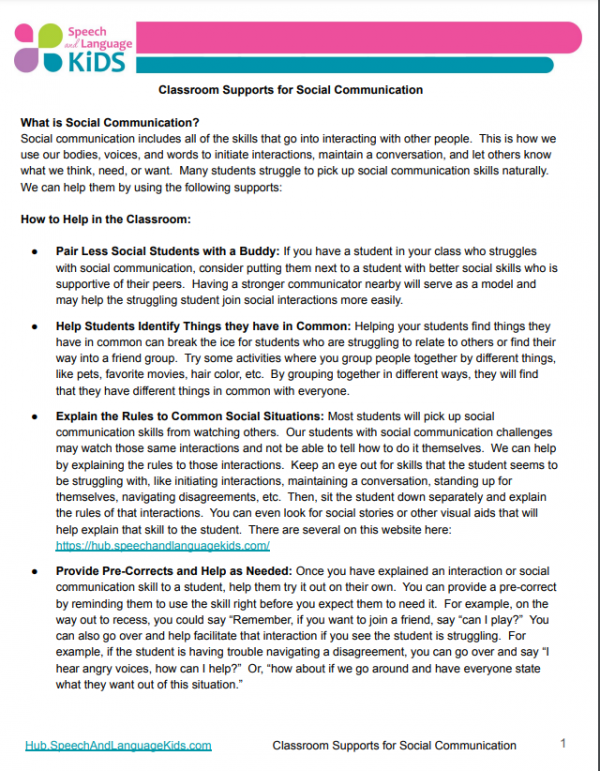School-Wide Supports for Children with Communication Challenges
Are you getting too many referrals? Perhaps many children in your school have low communication skills and could use a little boost. Instead of putting them all through the special education process, try implementing a school-wide communication program that will help all students and reduce the number of SPED referrals coming your way. Desiree from SLP Talk joined us on the Speechie Show to share her 5 tips for doing just that. #speechieshow
Below are the links to the products that were talked about in the Speechie show:
- SLP Talk Website: http://www.slptalkwithdesiree.com/
- Teachers Pay Teachers Store: https://www.teacherspayteachers.com/Store/Slptalk-With-Desiree
- Escape the Speech Room: http://www.slptalkwithdesiree.com/2017/04/escape-speech-room.html
- Smarty Ears Basic Concepts Screener App: http://smartyearsapps.com/service/basic-concepts-skills-screener/
- See Saw Digital Portfolio App: https://web.seesaw.me/
- Articulation Mirror Station: https://www.teacherspayteachers.com/Product/Articulation-Mirror-Station-1724145
If you’d rather listen to the audio version of the Speechie Show, click here:
Or if you prefer to read the transcript, see below:
Welcome to the Speechie Show! Being a speech language pathologist often means having too much work and not enough planning time. To beat the overwhelm, we’re bringing you the tricks and tools that will make your job a little bit easier.
Carrie: Hello everyone and welcome to the Speechie Show. We’re trying this one more time. I’m Carrie Clark from speechandlanguagekids.com and I’m here today with Desiree from SLPTalk. How are you Desiree?
Desiree: I’m doing well, how are you Carrie?
Carrie: Doing’ alright. We are having some issues with our internet connectivity today and our brains. So hopefully this will continue to work. But we are here today on the Speechie Show to talk about what to do if you are having too many kindergarten referrals or just referrals in general and how you can implement some school wide activities and programs that are going to help improve communication across the board which is great for better hearing and speech month. Which is coming up right around the corner. So, if you are new to the show, I am Carrie Clark. I am your host. Each week we do the Speechie Show on Facebook Live and I have a guest come on and talk about 5 tips for something that they are passionate about. And we do different topics each week. It’s a lot of fun and we’re going to do some giveaways here in just a minute. So, hang tight if you are watching with us live. Or if you are watching the recording or listening to the recording on the podcast later, welcome and thank you for joining us today. Alright so Desiree let’s get started with you telling us a little bit about you and what you are up to these days.
Desiree: Ok, well I am a school-based speech language pathologists. I am currently in Ohio and I have been practicing for 17 years. And I’m kind of passionate, not kind of, I am passionate about stepping outside of just your metaphorical speech room per se and really embedding yourself within the school community or whatever setting you are in and becoming a team member.
Carrie: Absolutely, that’s great. Ok if you are watching with us live, go ahead and comment in… does your school have school wide programs like this where you are working on communication skills with students other than your IEP students. Give me a yes in the comments. And while their doing that, Desiree can you tell us why it is important for us to be thinking about these school wide types of approaches as opposed to just, I see my kids in the speech room?
Desiree: Oh gosh it’s so multifaceted. One is that…some are obvious…is that you get to know the staff and the students more and you’re not this enigma. You know what is speech or where is speech. You’re not an enigma. And so, then I feel like from that you get a better positive response from the students. Of course, most of the students when you go are saying pick me pick me. But from the teachers as well from getting more appropriate referrals and then also understanding more of the skill of our practice and realizing that it is broader than they had anticipated.
Carrie: Absolutely, yeah. Alright we’re getting some comments in here. Looks like a lot of people saying no that they are not doing these kinds of school wide programs. Lindsey says this is a great time for this, I’ve been trying to figure out what to do for May speech and language month. Yeah so, May is better hearing and speech month if you guys are not aware of that. And there’s going to be all kinds of social media campaigns going on during that month. But this is a great thing to do to improve speech and language skills across the school and to increase awareness about our field and like to said our scope of practice. Who all can we help in those classrooms. Alright so we are going to share with you 5 tips today that you can use to help try to create some of these programs and create some of this awareness and become part of that school community and part of that team. So, the first one we are going to talk today about is using your resources. So, Desiree, what does that look like for you?
Desiree: Ok so for me, using your resources is essentially looking at all things outside our box and really collaborating with those teachers. Finding out what’s going on in the classroom. Finding out what the need is as well and utilizing those. As far as, we’ll talk about in a little bit to, is a language development zone in kindergarten. I do it along with our title one specialists. So, we are a title one school and to be completely honest the title one specialist approached me and said hey how would you like to have your hands on every kindergartner every other week, because we’ll split the class. And I said absolutely. I work in a very low income school and 99% of our kids qualify for free and reduced lunch and almost a third of our population are English language learners. So, for me it capturing that and putting in that intervention in place is going to be much more productive for my time to kind of determine who truly has a distorter versus needs that exposure.
Carrie: Absolutely, yeah. And I think a big part of that like to said, talking to the teachers about what they need. Because if you come into the classroom and you said hey I’ve got this awesome new program, we’re going to put it in your classroom and it’s all this extra work for you. That’s what the teachers hear. But if you say, ok what do you need help with. What are you struggling with when it comes to communication, how can I support you. I feel like you’re going to get way better buy in and they’ll be like oh this is an asset to me as opposed to just one more thing on my check list.
Desiree: Absolutely. And your resources don’t have to lie just in your building either. It’s in a community greeter program who had different members of the community come in and greet our kids in the morning and say hi and it worked on…click here to read the full transcript.

About the Author: Carrie Clark, MA CCC-SLP
Hi, I’m Carrie! I’m a speech-language pathologist from Columbia, Missouri, USA. I’ve worked with children and teenagers of all ages in schools, preschools, and even my own private practice. I love digging through the research on speech and language topics and breaking it down into step-by-step plans for my followers.
Connect with Me:




Leave A Comment